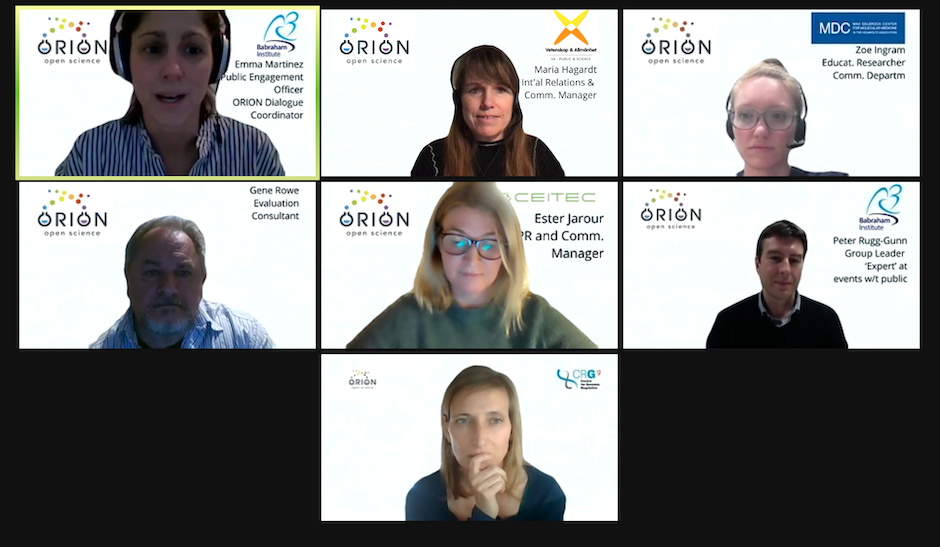The online Engage Festival, organised by the National Coordinating Centre for Public Engagement (NCCPE) in the UK brought together public engagement and science communication professionals from all over the UK and the EU for discussions, knowledge exchange and networking. The ORION project ran a session to share experiences of how public dialogues could be a tool for public engagement on societal issues such as genome editing.
In the ORION session “Public Dialogues: A valuable tool for Higher Education Institutes?” on the 1st December we discussed the many benefits of organising public dialogues as a public engagement activity. The event brought together ORION representatives, public engagement professionals and other key professionals participating in the Engage festival. Emma Martinez, Public Engagement Officer at the Babraham Institute, UK, and the person responsible for co-creation experiments and organising the public dialogue within ORION, presented the process, method and set-up of the public dialogue which was held in Czech Republic, Germany, Sweden and the UK during 2019-2020.
The objective of the ORION public dialogue was to explore the challenges and opportunities the public has concerning genome editing, their hopes and fears regarding the use of genome editing techniques, and how the ORION partners should communicate about and engage society with this emerging technology. Thirty members of the general public participated in public dialogues in each of the participating countries during two reconvened events.
The findings show that the citizens had limited awareness of genome editing. This is a recurrent finding revealed in the ORION survey on "Public attitudes to life sciences research (and genome editing) in six European countries" conducted in 2018. However, there was major support for fundamental research among the participants of the public dialogues. Once the public understood the exploratory nature of basic research, they appreciated that it is an important part of the scientific process that leads to clinical applications. However, the study highlighted a need for more two-way engagement. Participants had a wide range of preferred communication methods from TV to social media however they also praised and valued events such as the ORION dialogue.
At the Engage session, each of the four ORION partners; CEITEC, Max Delbrück Center for Molecular Medicine in the Helmholtz Association (MDC), VA (Public & Science) and the Babraham Institute were invited to present their motivation for participating in the public dialogue, the main challenges they encountered and the expected impact of the activity. Dr Peter Rugg-Gunn, Group Leader of Epigenetics, at the Babraham Institute, who participated in the public dialogue as an ‘expert’ commented:
“Our motivation was to understand the public opinion of genome editing in relation to our work and learn what we could do to address any concerns. The aim was to inform the next round of our public engagement strategy. The dialogue provided scientists at the Institute with a valuable opportunity to engage with a diverse range of views and stakeholders.”

The motivation of the Czech partner CEITEC was to learn something new about the target audience (general public) and to learn from more experienced partners in the area of public engagement, explained Ester Jarou, PR and Communications Manager.
The German partner MDC, represented by Zoe Ingram, Educational Scientist, was interested to find out how engaged the public is with scientific discovery, the scientific process and how informed they are as well as to understand their overall stance or relationship to biomedical research.
Maria Hagardt, International relations and Communications Manager with the Swedish ORION partner, VA (Public & Science) explained, “To be able to try out new ways of engaging citizens with science and collecting their views on disruptive technologies as well as to engage members of the public in research who may not usually get their voices heard was the motivation for VA's participation”.
Emma Martinez, stated that the main challenge for the Babraham Institute has been coordinating the project across multiple countries with different motivations/expectations. On the one hand there was a need for the dialogue to be flexible and adaptable to each organisation's needs and context. On the other hand there was a need for the dialogue to be comparable across countries. Another challenge is that it’s very time and personnel resource intensive to arrange and run a public dialogue. However, despite these challenges, the main takeaway is that the public dialogues have had a positive impact on the participating organisations. Bringing the public and experts together increased awareness among participating scientists that the public does support fundamental research (once they understand its role). It also brought an attitude shift both within the experts and the participants. Another impact was the new connections made with important stakeholders.
Moreover, the public dialogue has shown that there is strong need to increase public awareness of genome editing technology in the participating countries. One aspect that was especially appreciated by participants was the opportunity to speak with scientists and be able to ask them questions. Ester Jarou, CEITEC said,
“The public dialogue really reinforced that organising outreach events and bringing science closer to lay audiences is an important task and responsibility of our institute. Not only for citizens but also for our scientists, especially the ones that were doing something like this for the first time.”
More information
To find out more about the session please get in touch with Emma Martinez at the Babraham Institute if you have any questions or need any additional information. The recording from the session is available on the ORION YouTube channel.
Highlights from the Engage Festival can be viewed on the NCCPE’s YouTube channel.
Register for the ORION Public dialogue report launch
On 21 January we’re running an online seminar where we will be presenting the full findings from the public dialogues. Join this event to discuss how public dialogues can contribute to inform strategies and the wider responsible research and innovation global effort. You will find more information about the event in our event calendar.